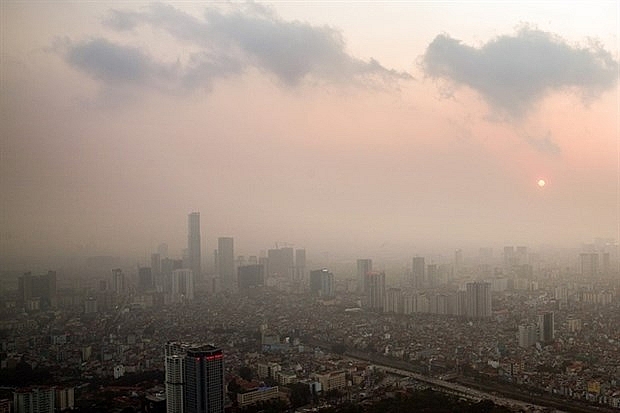Hanoi schools to shut on bad air days
 |
| Thick polluting haze envelopes the centre of Hanoi (Source: VNA) |
The Hanoi People’s Committee on December 25 issued Directive No 19 on dealing with air pollution and improving AQI, which focuses on tightening management over pollution agents and raising awareness over environmental protection and climate change.
The AQI level for shutting schools will be determined based on data collected by the Hanoi Department of Natural Resources and Environment.
Running from 0 to 500, AQI indicates levels of air pollution and impacts on public health. Children, old people and those with respiratory diseases start experiencing health effects when the AQI hits 100.
Seven million children die of air pollution-related diseases per year while nine of 10 breathe air not healthy for humans worldwide, according to the World Health Organisation.
Children’s health and cognitive development are damaged by exposure to poor environmental conditions, especially polluted air.
City authorities called for interdisciplinary co-ordination in coping with rising air pollution.
The Hanoi Sub-Department of Environmental Protection was asked to maintain the stable operation of air quality tracking systems and integrate its information with data collected from the stations of French and US embassies.
The Department of Health will have to implement mechanisms to prevent respiratory diseases once the AQI reaches unhealthy levels, including guiding people to protect themselves from filthy air.
Meanwhile, the Department of Construction is responsible for working with Urban Environment Company and its subsidiaries to control dust by vacuuming and watering streets whenever the AQI starts being reported at 'unhealthy for sensitive groups' levels at 101. All trucks weighing from 1.5 tonnes can only enter the city within Belt Road No 3 from 22.00 to 6.00 of the following day.
City police were asked to launch campaigns to fine vehicles loading construction materials and waste without suitable covers. At the same time, city authorities will encourage people to stop using honeycomb briquettes and burning crops, which both worsen air pollution in Hanoi.
Earlier this month, the Ministry of Health for the first time announced a list of 14 recommendations to deal with air pollution.
The announcement was made only a week after extreme air pollution hit Hanoi with the AQI stuck at hazardous levels.
According to Le Viet Phu, an economist from HCM City-based Fulbright University Vietnam, air pollution cost the country 5 to 7 percent of GDP in 2018, equivalent to 11.4-15.9 billion USD, with approximately 40,000 deaths related to unhealthy air.
What the stars mean:
★ Poor ★ ★ Promising ★★★ Good ★★★★ Very good ★★★★★ Exceptional
Related Contents
Latest News
More News
- Nestlé Vietnam's Lunar New Year campaign reframes how Tet is counted (January 28, 2026 | 11:40)
- Tet event in Japan celebrates success of 14th National Party Congress (January 25, 2026 | 10:04)
- 14th National Party Congress wraps up with success (January 25, 2026 | 09:49)
- Congratulations from VFF Central Committee's int’l partners to 14th National Party Congress (January 25, 2026 | 09:46)
- List of newly-elected members of 14th Political Bureau announced (January 23, 2026 | 16:27)
- 14th Party Central Committee unanimously elects To Lam as General Secretary (January 23, 2026 | 16:22)
- List of members of 14th Party Central Committee announced (January 23, 2026 | 09:12)
- Highlights of fourth working day of 14th National Party Congress (January 23, 2026 | 09:06)
- Press provides timely, accurate coverage of 14th National Party Congress (January 22, 2026 | 09:49)
- Press release on second working day of 14th National Party Congress (January 22, 2026 | 09:19)

 Tag:
Tag:




















 Mobile Version
Mobile Version